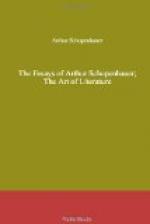The first rule, then, for a good style is that the author should have something to say; nay, this is in itself almost all that is necessary. Ah, how much it means! The neglect of this rule is a fundamental trait in the philosophical writing, and, in fact, in all the reflective literature, of my country, more especially since Fichte. These writers all let it be seen that they want to appear as though they had something to say; whereas they have nothing to say. Writing of this kind was brought in by the pseudo-philosophers at the Universities, and now it is current everywhere, even among the first literary notabilities of the age. It is the mother of that strained and vague style, where there seem to be two or even more meanings in the sentence; also of that prolix and cumbrous manner of expression, called le stile empese; again, of that mere waste of words which consists in pouring them out like a flood; finally, of that trick of concealing the direst poverty of thought under a farrago of never-ending chatter, which clacks away like a windmill and quite stupefies one—stuff which a man may read for hours together without getting hold of a single clearly expressed and definite idea.[1] However, people are easy-going, and they have formed the habit of reading page upon page of all sorts of such verbiage, without having any particular idea of what the author really means. They fancy it is all as it should be, and fail to discover that he is writing simply for writing’s sake.
[Footnote 1: Select examples of the art of writing in this style are to be found almost passim in the Jahrbuecher published at Halle, afterwards called the Deutschen Jahrbuecher.]
On the other hand, a good author, fertile in ideas, soon wins his reader’s confidence that, when he writes, he has really and truly something to say; and this gives the intelligent reader patience to follow him with attention. Such an author, just because he really has something to say, will never fail to express himself in the simplest and most straightforward manner; because his object is to awake the very same thought in the reader that he has in himself, and no other. So he will be able to affirm with Boileau that his thoughts are everywhere open to the light of the day, and that his verse always says something, whether it says it well or ill:
Ma pensee au grand jour partout s’offre
et s’expose,
Et mon vers, bien ou mal, dit toujours
quelque chose:
while of the writers previously described it may be asserted, in the words of the same poet, that they talk much and never say anything at all—quiparlant beaucoup ne disent jamais rien.
Another characteristic of such writers is that they always avoid a positive assertion wherever they can possibly do so, in order to leave a loophole for escape in case of need. Hence they never fail to choose the more abstract way of expressing themselves; whereas intelligent people use the more concrete; because the latter brings things more within the range of actual demonstration, which is the source of all evidence.




